Getting Started: 2023 Link Building Best Practices
Let’s quickly cover the basics of link building first:
- The best backlinks come from high-authority sites whose niche is the same as yours, or very closely related.
- If a link has a rel=nofollow attribute, it’s called a “nofollow” link, and it does not pass domain authority to your website. Ideally, you want to build links without that attribute (called “dofollow” links) so your domain authority increases. However, “nofollow” links are good for your link profile, too – they make you appear genuine in Google’s eyes.
- One “dofollow” backlink from a domain is enough. But of course, more of them won’t hurt.
- Try to make the anchor text of your backlinks match your ranking keywords. For example, if you run a “bakery shop in London”, your ideal backlink has that exact anchor text.
Lastly, when you find a website for link building, check its domain authority first. If it isn’t high enough, then you might want to change your mind.
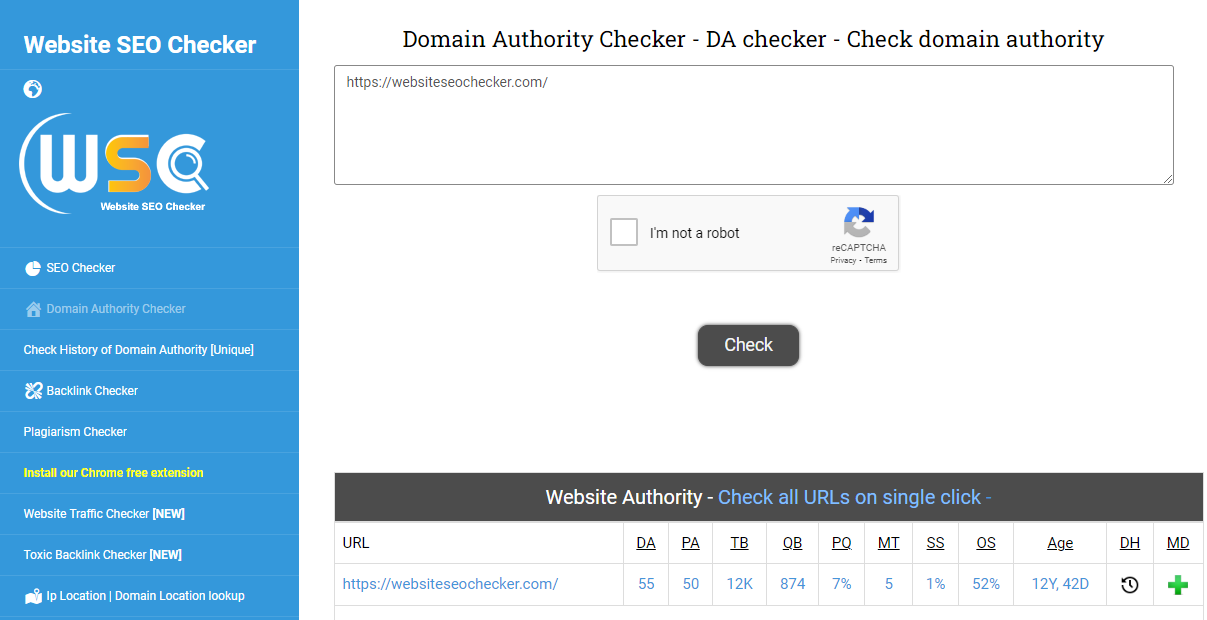 Screenshot from Website SEO Checker, February 2023
Screenshot from Website SEO Checker, February 2023With these recommendations in mind, how do you build links to your site?
Many opportunities are already out there, waiting for you. Others, you will have to create with your own hands. We’ll cover both types here.
1. Look For Potential Links In Competitor Backlink Profiles
Difficulty: Easy
Building links on your own can be quite difficult. But there’s no need to think too hard about it.
There’s a very easy and obvious place to look first: your competitors.
Successful sites have already done plenty of their own link building. Their backlink profiles are filled with domains that are interested in linking to sites like theirs – and like yours. Those domains just don’t know about you yet.
But that can change, and this change is up to you.
How To Easily Build Links With Competitor Backlink Profiles
First, prepare a list of your direct competitors. If you already know who they are, you can skip to the next step. If you still haven’t found them, then there are two ways to do it:
- Do a Google search for your target keywords. You can pick competitor websites from the first SERP, but such an approach isn’t very reliable due to the severe lack of information you get.
- Use an SEO tool for finding competitors. This way, you can get tons of information to make further decisions.
For example, WebCEO’s Dangerous Competitors tool gives you a table like this:
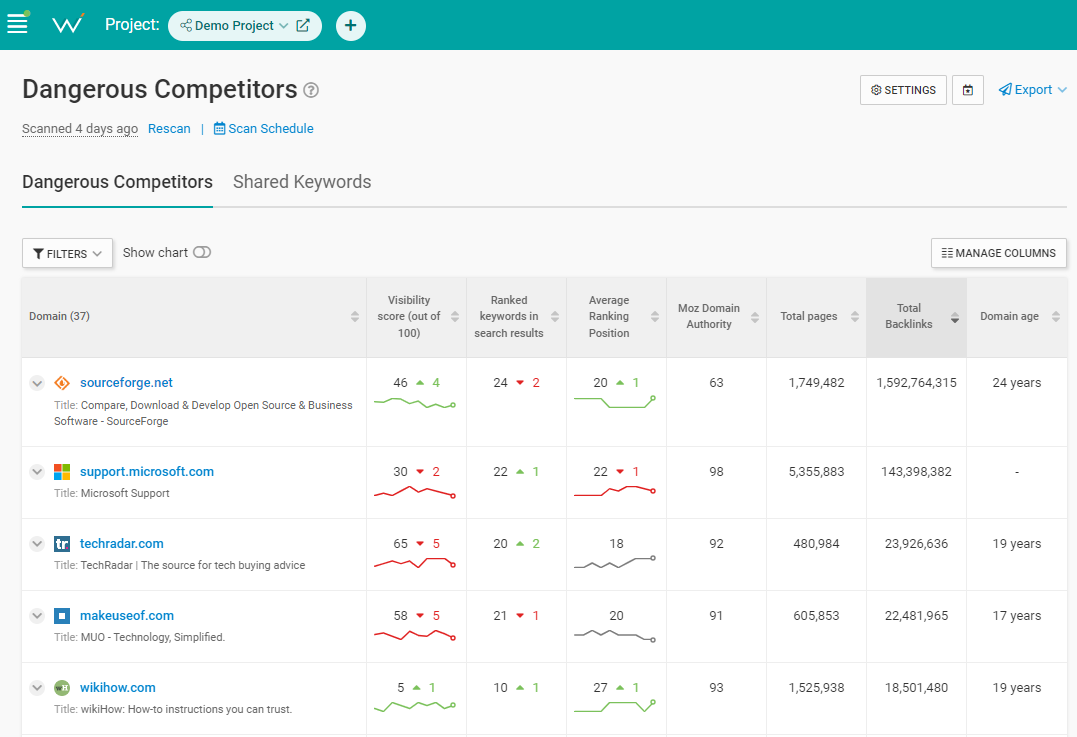 Screenshot from WebCEO, February 2023
Screenshot from WebCEO, February 2023The Total Backlinks column can point you to the richest sources of backlinks.
Once inside, open the Competitor Backlink Spy tool -> Settings button -> Competitors tab. Enter your competitors’ URLs and press Save.
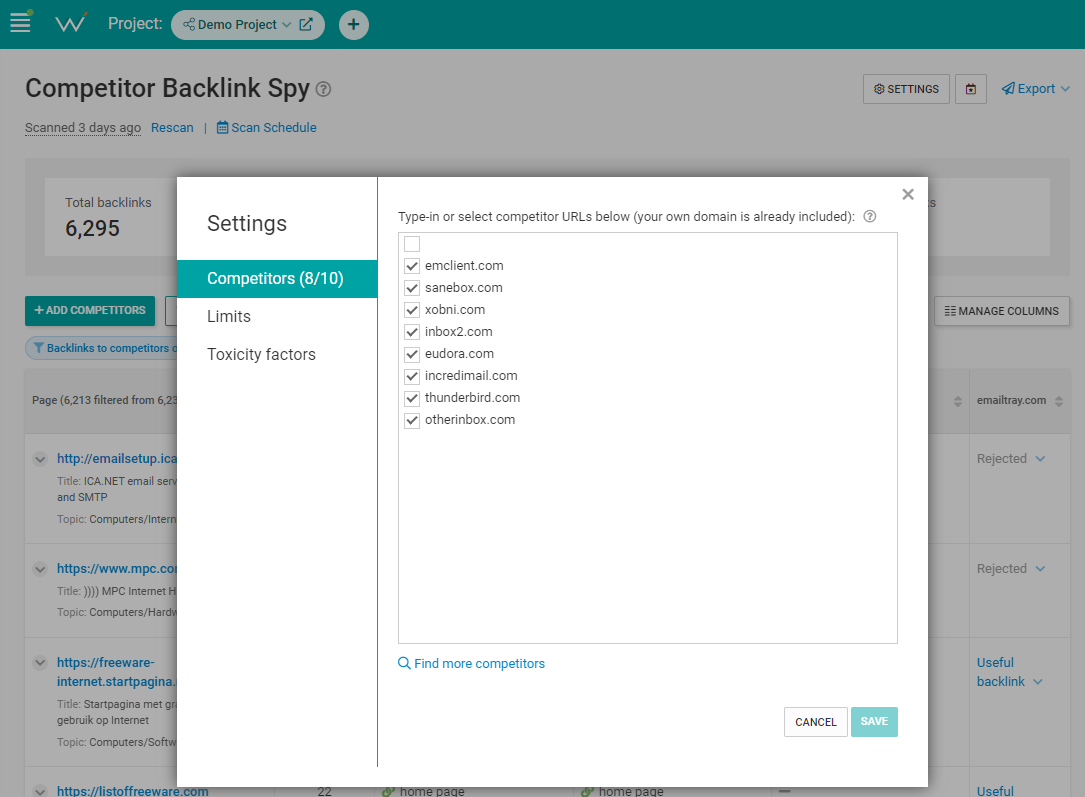 Screenshot from WebCEO, February 2023
Screenshot from WebCEO, February 2023You’ll get a table with all the pages linking to your competitors. (Some of those pages may even be linking to you as well!)
Sort the table by the Domain Trust Flow column to see the most authoritative domains. Ideally, you want to have your own backlinks there, too.
But how can you get backlinks there?
Most of the time, you cannot place a backlink on a website yourself (otherwise, link building wouldn’t be such a challenge). You can wait until somebody finds your content and decides to give you a backlink on their own, or you can take the matters into your own hands – by making contact.
How To Perform Backlink Outreach
Email and social media are the best ways to reach out to the person in charge of a website’s content.
What should you write in your message?
- Start with greetings and a self-introduction.
- Explain what kind of value you can offer to their site and audience.
- Give the link to your content and suggest making a backlink to it. (Bonus points if you can also suggest a page where this backlink would fit.)
- Add an email signature with your photo and contact information. You can generate it with a free tool like WiseStamp.
- Fill out the subject line. Write about the problem you are offering to solve.
If you want an example of what to write, very few can match Brian Dean’s energy:
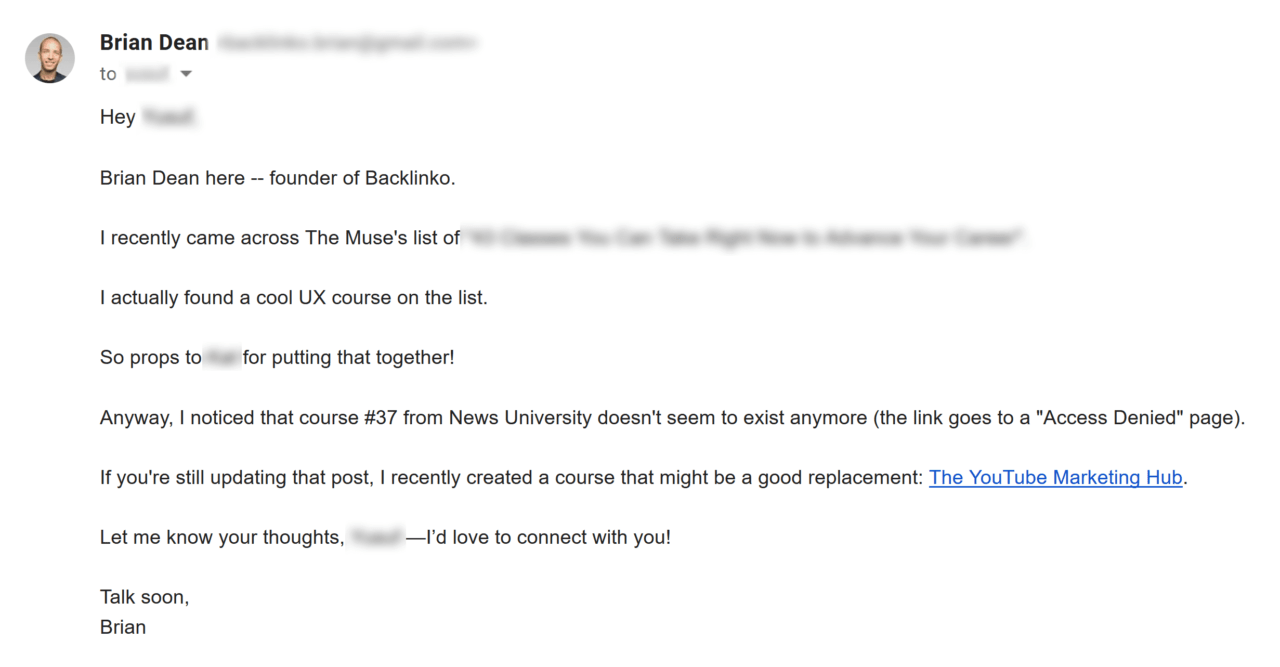 Screenshot from Backlinko.org, February 2023
Screenshot from Backlinko.org, February 2023Outreach is a vital step in link building that you will be doing a lot. You want to have multiple templates ready and improve them whenever possible.
Now, where can you find opportunities to contact people and offer them your valuable content?
2. Turn Unlinked Mentions Into Links
Difficulty: Easy
In order to get a backlink, you must first be mentioned on another site. Chances are, your site has been mentioned by another brand, but they haven’t linked back to your website.
Time to capitalize on those unlinked mentions.
For this tip, most of the work is already done for you – that’s why it’s the easiest way to build links.
All you need to do is contact the person who can edit that page and ask them to add a link.
How Do I Find Unlinked Brand Mentions On Other Websites?
Use a tool like WebCEO’s Web Buzz Monitoring to find such unlinked mentions.
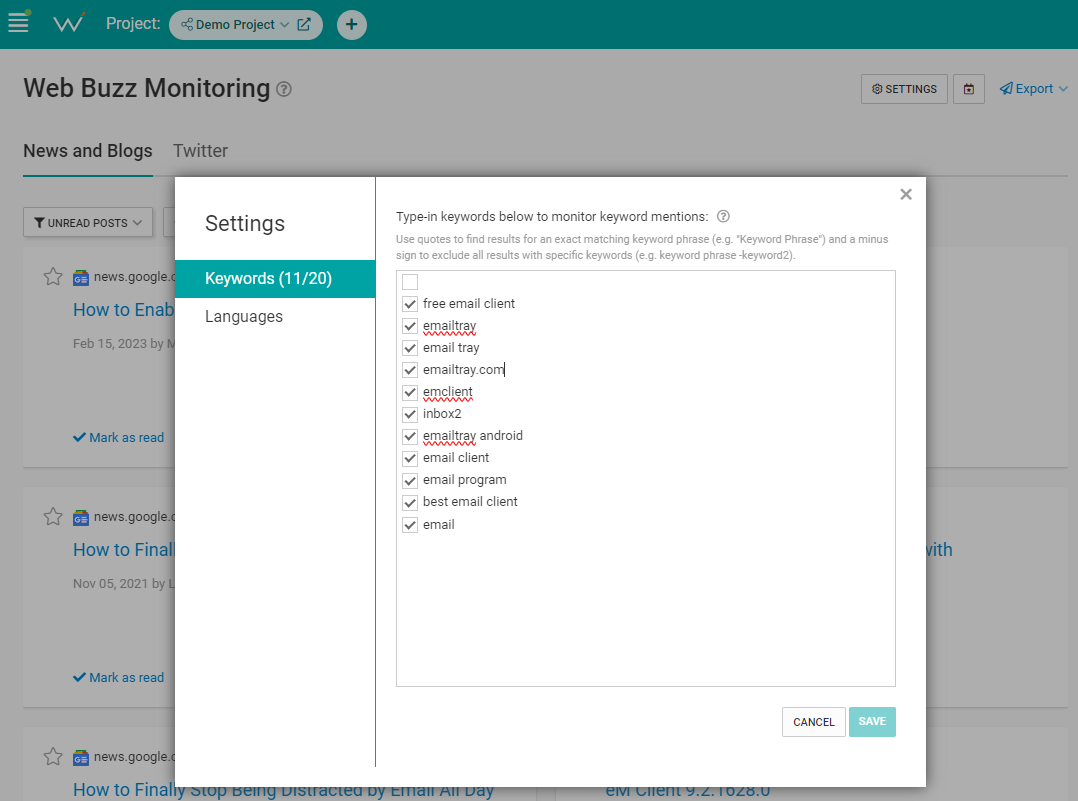 Screenshot from WebCEO, February 2023
Screenshot from WebCEO, February 2023By the way, a mention doesn’t have to be a word. When somebody uses an original image from your site, that counts too. If you catch someone using your images, you can turn them into backlinks in the same manner.
Just search your original images in Google to see who’s using them.
3. Create Unique Sources Of Valuable Data
Difficulty: Hard
“Content is king.” “Make high-quality content.” No doubt you’ve heard these phrases a million times already.
What kind of content do you actually have to make if your goal is to get backlinks?
Of course, any content can get links, as long as you find the right audience. But certain types of content do get linked more often than most.
What Are The Best Types Of Content To Use To Get Organic Backlinks?
- Graphs.
- Surveys.
- Research results.
- Infographics.
- Case studies.
Basically, anything with valuable data in it will be linkable information.
People love citing statistics and percentages, and I’m sure you can relate.
How many times have you needed to include some numbers in your content and gone to Google for a source?
And once you’ve found and cited it, what did you do next? You added a link.
So, if you can create this kind of content for your own site, there’s a high chance people will want to cite you – especially if you are a real expert who can provide rare data. Challenging, but so worth it.
4. Offer To Replace Other Sites’ Broken Links
Difficulty: Average
If you have excellent content, this is one of the ways to put it to good use.
Broken links always pose a problem.
Standard practice is removing them as soon as you find them on your site. However, sometimes site owners take their sweet time doing so – and that’s where great link building opportunities exist for you.
Here’s how it works: you visit another site and see a broken link. Did it previously point to a content piece that was similar to something you have? If yes, feel free to step in and offer your own content.
How Do You Find Broken Links?
- On a single page: use a tool like the Check My Links Chrome extension.
- On an entire domain: use WebCEO’s Site Audit tool. (You will have to create a separate project for the site you want to examine.)
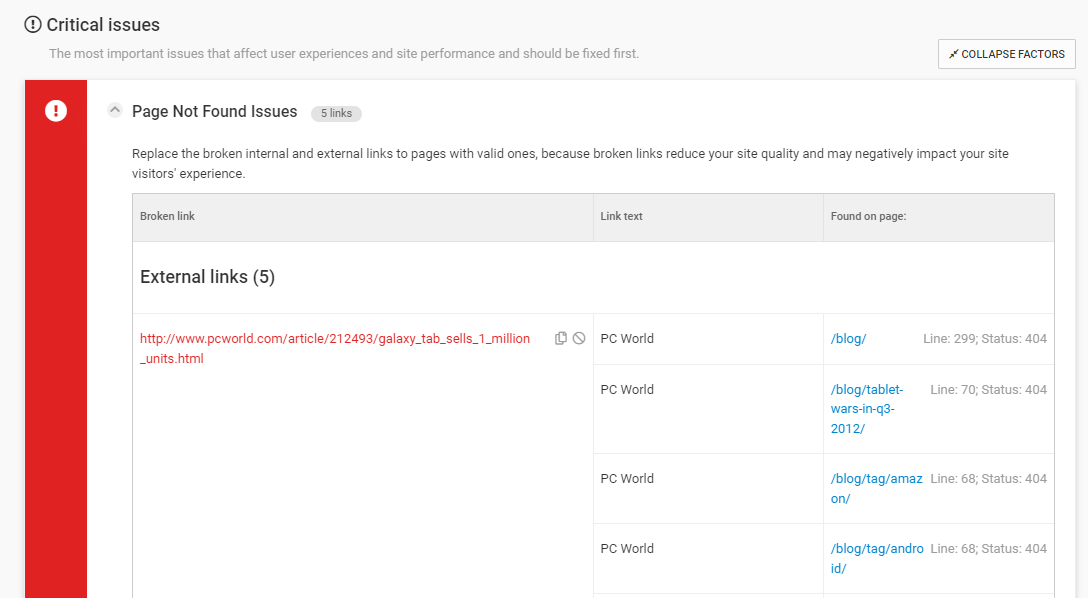 Screenshot from WebCEO, February 2023
Screenshot from WebCEO, February 2023To make sure the deleted content was indeed similar to yours, use Wayback Machine to see what the content was.
How Do You Reach Out To Site Owners To Replace Broken Links With Yours?
After you’ve discovered broken links of content that was similar to yours, it’s time to offer your link as a replacement.
Find the person who can edit the page with the broken link and contact them (like in the example above by Brian Dean). The key is to offer something of value first and only then ask for a backlink.
Broken link building works with any website (as long as it’s a valid candidate for link building). But ideally, you should try and get such backlinks from your competitors. You share a niche with them, and they most likely have a higher domain authority than you, making them a perfect backlink source. Resource pages are another great option.
Lastly, a variation of broken link building: instead of broken links, offer to replace links to outdated content.
5. Keep Your Own Content Up-To-Date
Difficulty: Easy
Speaking of outdated content – the previous point implies it’s a common issue, doesn’t it?
Link building isn’t only about making new links. It’s about the whole process of creating a strong link profile. This process includes:
- Building new backlinks.
- Removing spammy backlinks.
- Retaining good backlinks.
You may have scored some great backlinks in the past, but those sites may stop linking to you if they find better sources out there.
In fact, creating and offering better linkable content is one of the best-known link-building techniques – except in this case you could on the losing side.
To avoid becoming the “loser” in this scenario, make sure your content is always in top condition, with the most up-to-date and helpful information. That way, you will retain more backlinks and prevent your domain authority from dropping.
6. Get Involved In Events & Projects
Difficulty: Average
Quick question: Do you prefer to participate in events or host your own? Or perhaps you might like to be a sponsor?
For this step, you should continue creating as much good content as you can. But you can also help other people create their content or support an event – that’s bound to earn you a mention, at the very least.
There’s no shortage of things and events where the organizers could use a hand. Real-life contests, online events, even a YouTube video – if it’s some kind of ambitious project.
Just remember that you want backlinks from websites that are thematically relevant to your own, so be choosy!
How To Find Projects Or Events To Sponsor For Backlinks
Websites like Meetup and Events.org are regularly updated with fresh events where you can get involved. Or maybe you already know a guy who knows a guy? Turn your connections into backlinks before someone beats you to it.
7. Offer Your Expertise To Other Websites
Difficulty: Hard
Are you confident in your expertise?
Is your or your brand’s name already known in your community? If so, you should put your knowledge and reputation to good use.
Look for websites where your input can bring value. Reach out to those sites’ content makers (unless they contact you first), and then you can:
- Write guest articles.
- Give interviews.
- Get published in online journals.
- Participate in podcasts.
These are solid link building opportunities because they always result in a backlink – and from an authoritative resource, too. Not to mention the wide audience you can reach this way.
The tough part is getting to the point where your word starts carrying enough weight, but once you are there, it actually becomes easier to create new backlinks.
Want to explore opportunities 8-14?
To discover even more ways to build links, download the full guide below, exclusively available for free to WebCEO users. Sign up and become the most successful link builder!
